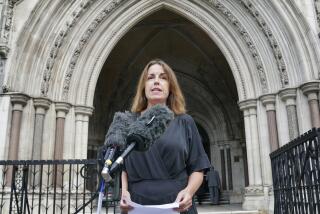Losses in Afghanistan stir anxiety in Britain
LONDON — Britain buried its highest-ranking army officer to die in combat in nearly three decades Thursday amid a growing public and political outcry over the presence and preparedness of the country’s troops in Afghanistan.
Lawmakers and ordinary people are angrily questioning whether a lack of helicopters and other equipment have been at least indirectly responsible for a recent wave of combat deaths in Afghanistan, where Britain’s deployment of 9,000 soldiers to fight the Taliban has become increasingly unpopular here at home.
Last week, eight British troops were killed over a 24-hour period. And on Thursday, mourners crowded into a London military chapel for an emotional farewell to Lt. Col. Rupert Thorneloe, 39, who was killed by a roadside bomb.
Also on Thursday, a parliamentary committee added fuel to the fire by releasing a report that said British military operations and troop safety in Afghanistan were being compromised by a shortage of choppers.
The report said that soldiers were often forced to rely on ground instead of air transport, which put them at greater risk of the roadside explosive devices that have proved to be the Taliban’s deadliest weapon.
The conflict in Afghanistan has quickly turned into a toxic issue for Prime Minister Gordon Brown, whose ruling Labor Party is already at painfully low levels in the polls. Appearing before senior lawmakers just a few miles away from the concurrent memorial service for Thorneloe, Brown defended his government’s handling of the war, insisting that British troops were of sufficient strength and had what they needed to get the job done.
“The troops that are necessary for the mission we are engaged in now are there,” Brown said. “We have spent the right sums of money and are prepared to do more to make sure that our troops are properly equipped.”
He declined to reveal, “on security grounds,” exactly how many helicopters were deployed in Afghanistan, saying only that the number had increased by 60% in a little over two years.
The issue of helicopters has become the focus of complaints over the prosecution of the Afghanistan war since it emerged that the head of the British army, Gen. Richard Dannatt, had to be flown around this week in an American chopper during a visit because British helicopters were unavailable.
Brown is implicated in the debate over the army’s fleet of helicopters because he was chancellor of the exchequer, or finance minister, in then-Prime Minister Tony Blair’s government when the chopper budget was slashed by $2.3 billion five years ago.
“Because Gordon Brown wasn’t willing to pay for Tony Blair’s wars, the army in particular, but all our armed forces, are suffering,” Liam Fox, the defense spokesman for the opposition Conservative Party, told the BBC.
Although it has been simmering as a political issue for some time, the war in Afghanistan was pushed to the forefront by the string of deaths last week.
Britain’s newspapers grieved over “our boys.” Mourners laid floral tributes across the country in remembrance. Large crowds have turned out to greet returning soldiers and the bodies of those killed.
As of last Friday, 184 British military personnel had died in Afghanistan since the U.S.-led overthrow of the Taliban there in 2001. That is five more than have been killed in Iraq.
Most of Britain’s 9,000 troops are deployed in the southern Afghan province of Helmand, where the Taliban is strongest and the conflict at its most violent. Although there is cross-party agreement in Parliament that Britain needs to stay the course in Afghanistan, ordinary Britons are divided over the issue.
The Guardian newspaper reported last month that senior military officials had requested an increase of 2,000 soldiers, but Brown’s government agreed to a further deployment of only 700 to help secure the presidential election to be held in Afghanistan in August.
Among the attendees at Thorneloe’s funeral was Prince Charles, who knew the lieutenant colonel and described him as among the best officers of his generation.
Thorneloe, Britain’s most senior officer to fall in combat since the 1982 Falklands War, was killed July 1 when a roadside bomb ripped through his armored vehicle in Helmand province. An 18-year-old soldier was also killed in the explosion.
Thorneloe was praised at the service as a commander who “led from the front.”
--
More to Read
Sign up for Essential California
The most important California stories and recommendations in your inbox every morning.
You may occasionally receive promotional content from the Los Angeles Times.











